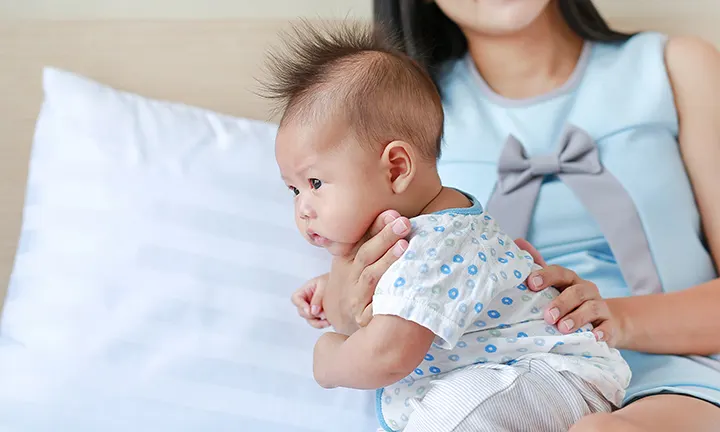Hiccups are a common occurrence in children, and while they are usually harmless, they can be bothersome. Understanding the causes of hiccups and knowing effective methods to stop them can help parents provide quick relief for their children. This article explores the easiest ways to get rid of hiccups in children, with simple and effective strategies that meet the needs of parents.
Understanding Hiccups: What Causes Them?
Hiccups are involuntary contractions of the diaphragm, a muscle that plays a key role in breathing. When the diaphragm contracts suddenly, the vocal cords close quickly, causing the characteristic “hic” sound. Several factors can trigger hiccups in children, including:
Eating Too Quickly: Children often eat quickly, swallowing air along with their food, which can irritate the diaphragm.
Overeating: Consuming large amounts of food can stretch the stomach, putting pressure on the diaphragm.
Drinking Carbonated Beverages: Carbonation in drinks can increase the amount of air in the stomach, leading to hiccups.
Excitement or Emotional Stress: Strong emotions, such as excitement, anxiety, or stress, can trigger hiccups in children.
Understanding these triggers can help parents prevent hiccups from occurring, but when they do happen, quick action can provide relief.
Simple Techniques to Stop Hiccups
There are several easy methods that parents can use to help their child get rid of hiccups. These techniques are safe and can be done at home with minimal effort.
1. Encourage Slow, Deep Breathing
One of the simplest ways to stop hiccups is by encouraging your child to take slow, deep breaths. This method helps relax the diaphragm and normalize breathing. Here’s how to do it:
Ask your child to breathe in slowly and deeply through the nose, holding the breath for a few seconds.
Then, instruct them to breathe out slowly through the mouth.
Repeat this process several times until the hiccups stop.
Deep breathing helps reset the diaphragm and can be an effective way to stop hiccups.
2. Offer a Glass of Water
Drinking a glass of water slowly can help interrupt the hiccup reflex. Here’s how it works:
Have your child take small sips of water continuously without pausing to breathe.
The consistent swallowing motion can help reset the diaphragm and stop the hiccups.
If your child finds it difficult to drink a full glass, smaller sips or even gargling with water may also help.
3. Try the “Hold Your Breath” Technique
Holding the breath for a short period can increase carbon dioxide levels in the blood, which may help stop the hiccups. Here’s what to do:
Ask your child to take a deep breath and hold it for as long as they can.
After a few seconds, they can exhale slowly.
Repeat this process a few times until the hiccups stop.
This method is simple and often effective in stopping hiccups quickly.
4. Use a Spoonful of Sugar or Honey
A spoonful of sugar or honey can help stimulate the vagus nerve, which plays a role in controlling the diaphragm. Here’s how to use this method:
For children over one year old, give them a spoonful of sugar or honey to swallow.
The sweet taste can distract the diaphragm and help reset its rhythm, stopping the hiccups.
This method should only be used with children who are old enough to safely consume honey or sugar.
Preventing Hiccups in Children
While hiccups are usually harmless, preventing them can save your child from discomfort. Here are some tips to help prevent hiccups:
1. Encourage Slow Eating
Teach your child to eat slowly and chew their food thoroughly. This reduces the likelihood of swallowing air, which can trigger hiccups. Encourage small bites and regular pauses during meals.
2. Avoid Carbonated Beverages
Limit your child’s intake of carbonated drinks, as these can cause the stomach to expand with gas, leading to hiccups. Offer water or non-carbonated drinks instead.
3. Manage Emotional Stress
Help your child manage strong emotions like excitement or anxiety, which can sometimes trigger hiccups. Deep breathing exercises and calming activities can help keep their emotions in check.
When to Seek Medical Attention
While hiccups are generally harmless, there are situations where they may indicate an underlying health issue. Parents should seek medical attention if:
Hiccups Last More Than 48 Hours: Persistent hiccups could be a sign of a more serious condition, such as gastrointestinal issues or nerve irritation.
Hiccups Accompany Other Symptoms: If hiccups are accompanied by symptoms such as difficulty breathing, chest pain, or vomiting, medical attention is necessary.
Frequent Hiccups: If your child experiences frequent hiccups, it may be worth discussing with a pediatrician to rule out any underlying issues.
See also: Can a Newborn Drink Water for Hiccups?
Conclusion
Hiccups in children are a common and generally harmless occurrence. By understanding the causes of hiccups and using simple techniques like slow breathing, drinking water, or swallowing sugar, parents can help their children get rid of hiccups quickly. Preventive measures, such as encouraging slow eating and managing emotional stress, can also reduce the likelihood of hiccups. However, if hiccups persist or are accompanied by other symptoms, it is important to seek medical advice.
By following these guidelines, parents can effectively manage hiccups in their children and ensure their comfort and well-being.


